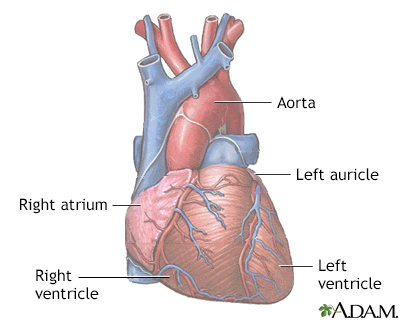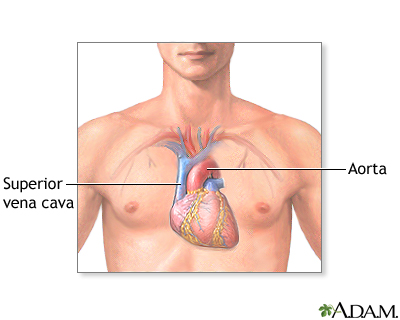Heart Transplant Overview
Learn About Heart Transplant
A heart transplant is surgery to remove a damaged or diseased heart and replace it with a healthy donor heart.
Cardiac ablation may also be referred to as heart ablation or catheter ablation.
Finding a donor heart can be difficult. The heart must be donated by someone who is brain-dead but is still on life support. The donor heart must be in normal condition without disease and must be matched as closely as possible to your blood and /or tissue type to reduce the chance that your body will reject it.
You are put into a deep sleep with general anesthesia, and a cut is made through the breastbone.
- Your blood flows through a heart-lung bypass machine while the surgeon works on your heart. This machine does the work of your heart and lungs while they are stopped, and supplies your body with blood and oxygen.
- Your diseased heart is removed and the donor heart is stitched in place. The heart-lung machine is then disconnected. Blood flows through the transplanted heart, which takes over supplying your body with blood and oxygen.
- Tubes are inserted to drain air, fluid, and blood out of the chest for several days, and to allow the lungs to fully re-expand.
A heart transplant may be done to treat:
- Severe heart damage after a heart attack
- Severe heart failure, when medicines, other treatments, and surgery no longer help
- Severe heart defects that were present at birth and can’t be fixed with surgery
- Life-threatening abnormal heartbeats or rhythms that do not respond to other treatments
Heart transplant surgery may not be used in people who:
- Are malnourished
- Are older than age 65 to 70
- Have had a severe stroke or dementia
- Have had cancer less than 2 years ago
- Have HIV infection
- Have infections, such as hepatitis, that are active
- Have insulin-dependent diabetes and other organs, such as the kidneys, that aren’t working correctly
- Have kidney, lung, nerve, or liver disease
- Have no family support and do not follow their treatment
- Have other diseases that affect the blood vessels of the neck and leg
- Have pulmonary hypertension (thickening of blood vessels in the lung)
- Smoke or abuse alcohol or drugs, or have other lifestyle habits that may damage the new heart
- Are not reliable enough to take their medicines, or if the person is not able to keep up with the many hospital and medical office visits and tests
Risks from any anesthesia are:
- Reactions to medicines
- Problems breathing
Risks from any surgery are:
- Bleeding
- Infection
Risks of transplant include:
- Blood clots (deep venous thrombosis)
- Damage to the kidneys, liver, or other organs from anti-rejection medicines
- Development of cancer from the drugs used to prevent rejection
- Heart attack or stroke
- Heart rhythm problems
- High cholesterol levels, diabetes, and bone thinning from the use of rejection medicines
- Increased risk for infections due to anti-rejection medicines
- Lung and kidney failure
- Rejection of the heart
- Severe coronary artery disease
- Wound infections
- The new heart may not work at all
Once you are referred to a transplant center, you will be evaluated by the transplant team. They will want to make sure that you are a good candidate for a transplant. You will visit many times over several weeks or even months. You will need to have blood drawn and x-rays taken. The following may also be done:
- Blood or skin tests to check for infections
- Tests of your kidney and liver
- Tests to evaluate your heart, such as ECG, echocardiogram, and cardiac catheterization
- Tests to look for cancer
- Tissue and blood typing, to help make sure your body will not reject the donated heart
- Ultrasound of your neck and legs
You will want to look at one or more transplant centers to see which would be best for you:
- Ask them how many transplants they perform every year and what their survival rates are. Compare these numbers with the numbers from other centers. These are all available on the internet at unos.org.
- Ask what support groups they have available and how much help they offer with travel and housing.
- Ask about the costs of medicines you will need to take afterwards and if there is any financial help in getting the medicines.
If the transplant team believes you are a good candidate, you will be put on a regional waiting list for a heart:
- Your place on the list is based on several factors. Key factors include the type and severity of your heart disease, and how sick you are at the time you are listed.
- The amount of time you spend on a waiting list is usually NOT a factor for how soon you get a heart, except in the case of children.
Most, but not all, people who are waiting for a heart transplant are very ill and need to be in the hospital. Many will need some sort of device to help their heart pump enough blood to the body. Most often, this is a ventricular assist device (VAD).
You should expect to stay in the hospital for 7 to 21 days after a heart transplant. The first 24 to 48 hours will likely be in the intensive care unit (ICU). During the first few days after a transplant, you will need close follow-up to make sure that you do not get an infection and your heart is working well.
The recovery period is about 3 months and often, your transplant team will ask you to stay fairly close to the hospital during that time period. You will need to have regular check-ups with blood tests, x-rays, and echocardiograms for many years.
Fighting rejection is an ongoing process. The body’s immune system considers the transplanted organ a foreign body and fights it. For this reason, organ transplant patients must take drugs that suppress the body’s immune response. To prevent rejection, it is very important to take these medicines and carefully follow your self-care instructions.
Biopsies of the heart muscle are often done every month during the first 6 to 12 months after transplant, and then less often after that. This helps determine if your body is rejecting the new heart, even before you have symptoms.
You must take drugs that prevent transplant rejection for the rest of your life. You will need to understand how to take these medicines, and know their side effects.
You can go back to your normal activities 3 months after the transplant as soon as you feel well enough, and after talking with your health care provider. Consult your provider if you plan to engage in vigorous physical activity.
If you develop coronary disease after a transplant, you may have cardiac catheterization every year.
Heart transplant prolongs the life of people who would otherwise die. About 80% of heart transplant patients are alive 2 years after the operation. At 5 years, 70% of patients will still be alive after a heart transplant.
The main problem, as with other transplants, is rejection. If rejection can be controlled, survival increases to over 10 years.




Published Date: April 24, 2021
Published By: Mary C. Mancini, MD, PhD, Director, Cardiothoracic Surgery, Christus Highland Medical Center, Shreveport, LA. Review provided by VeriMed Healthcare Network. Also reviewed by David Zieve, MD, MHA, Medical Director, Brenda Conaway, Editorial Director, and the A.D.A.M. Editorial team.
Chiu P, Robbins RC, Ha R. Heart transplantation. In: Sellke FW, del Nido PJ, Swanson SJ, eds. Sabiston and Spencer Surgery of the Chest. 9th ed. Philadelphia, PA: Elsevier; 2016:chap 98.
Jessup M, Atluri P, Acker MA. Surgical management of heart failure. In: Zipes DP, Libby P, Bonow RO, Mann, DL, Tomaselli GF, Braunwald E, eds. Braunwald’s Heart Disease: A Textbook of Cardiovascular Medicine. 11th ed. Philadelphia, PA: Elsevier; 2019:chap 28.
Kliegman RM, St. Geme JW, Blum NJ, Shah SS, Tasker RC, Wilson KM. Pediatric heart and heart-lung transplantation. In: Kliegman RM, St. Geme JW, Blum NJ, Shah SS, Tasker RC, Wilson KM, eds. Nelson Textbook of Pediatrics. 21st ed. Philadelphia, PA: Elsevier; 2020:chap 470.
McMurray JJV, Pfeffer MA. Heart failure: management and prognosis. In: Goldman L, Schafer AI, eds. Goldman-Cecil Medicine. 26th ed. Philadelphia, PA: Elsevier; 2020:chap 53.
Yancy CW, Jessup M, Bozkurt B, et al. 2017 ACC/AHA/HFSA Focused Update of the 2013 ACCF/AHA guideline for the management of heart failure: a report of the American College of Cardiology/American Heart Association Task Force on Clinical Practice Guidelines and the Heart Failure Society of America. J Card Fail. 2017;23(8):628-651. PMID: 28461259 pubmed.ncbi.nlm.nih.gov/28461259/.
Duke Health Integrated Practice Inc
Adam Devore is an Advanced Heart Failure and Transplant Cardiologist and a Cardiologist in Durham, North Carolina. Dr. Devore is rated as an Elite provider by MediFind in Heart Transplant. His top areas of expertise are Heart Failure, Heart Failure with Preserved Ejection Fraction (HFpEF), Pulmonary Edema, Heart Transplant, and Endoscopy. Dr. Devore is currently accepting new patients.
University Of Texas Southwestern Medical Center At Dallas
Maryjane Farr is an Advanced Heart Failure and Transplant Cardiologist and a Cardiologist in Dallas, Texas. Dr. Farr is rated as an Elite provider by MediFind in Heart Transplant. Her top areas of expertise are Heart Failure, Cardiogenic Shock, Cardiomyopathy, Pulmonary Edema, and Heart Transplant.
University Medical Associates Of The Medical University Of South Carol
Arman Kilic is a Thoracic Surgeon and a General Surgeon in Charleston, South Carolina. Dr. Kilic has been practicing medicine for over 17 years and is rated as an Elite provider by MediFind in Heart Transplant. His top areas of expertise are Cardiogenic Shock, Aortic Dissection, Mitral Valve Regurgitation, Heart Transplant, and Coronary Artery Bypass Graft (CABG). Dr. Kilic is currently accepting new patients.
Summary: The purpose of this study is to evaluate if Non-Ischemic Heart Preservation (NIHP) of extended criteria donor hearts using the XVIVO Heart Preservation System (XHPS) is a safe and effective way to preserve and transport hearts for transplantation.
Summary: The goal of this prospective randomized single blind multicenter phase II study is to compare organ perfusion with Custodiol-N and Custodiol in heart transplantation in children of all ages (birth to \<18 years) being listed on the waiting list for heart transplantation. The main question it aims to answer is: to compare the safety of Custodiol-N in heart transplantation in children in comparison ...

